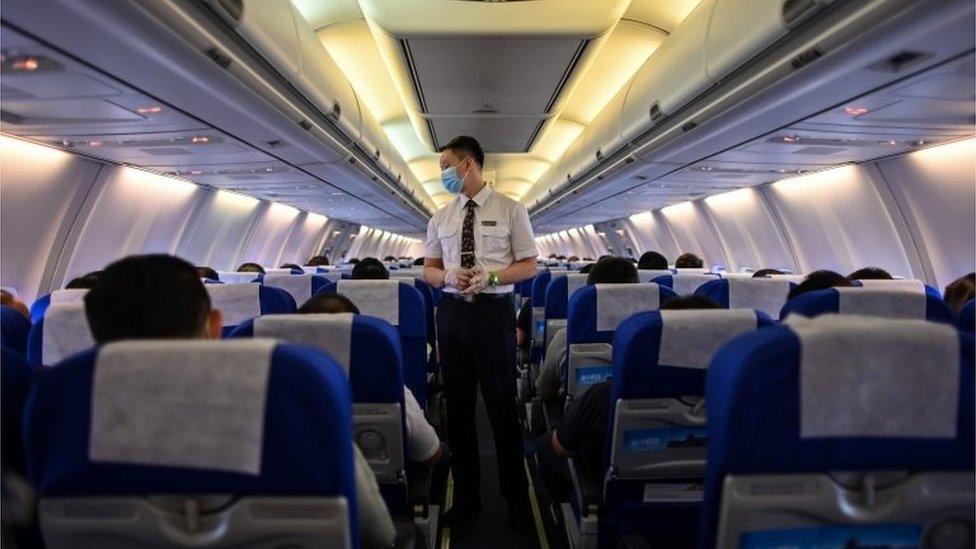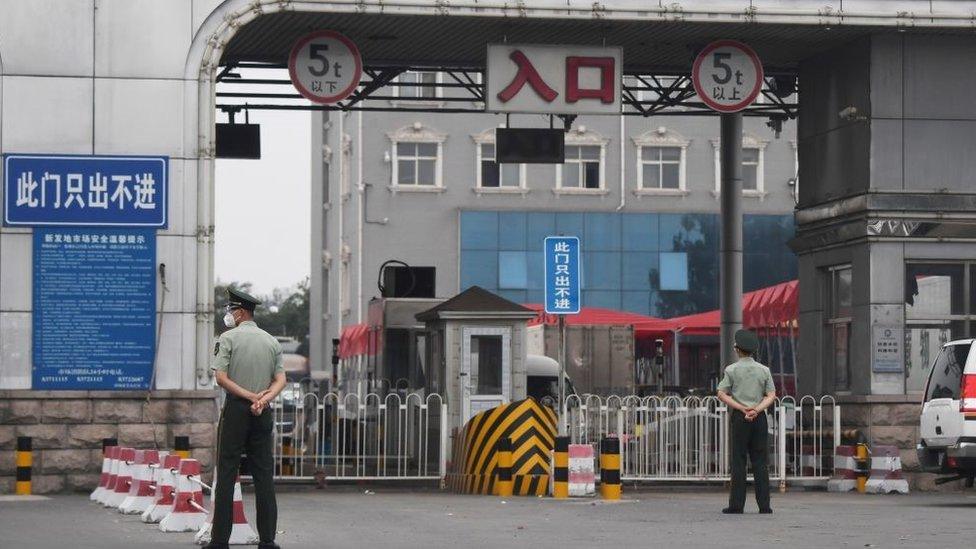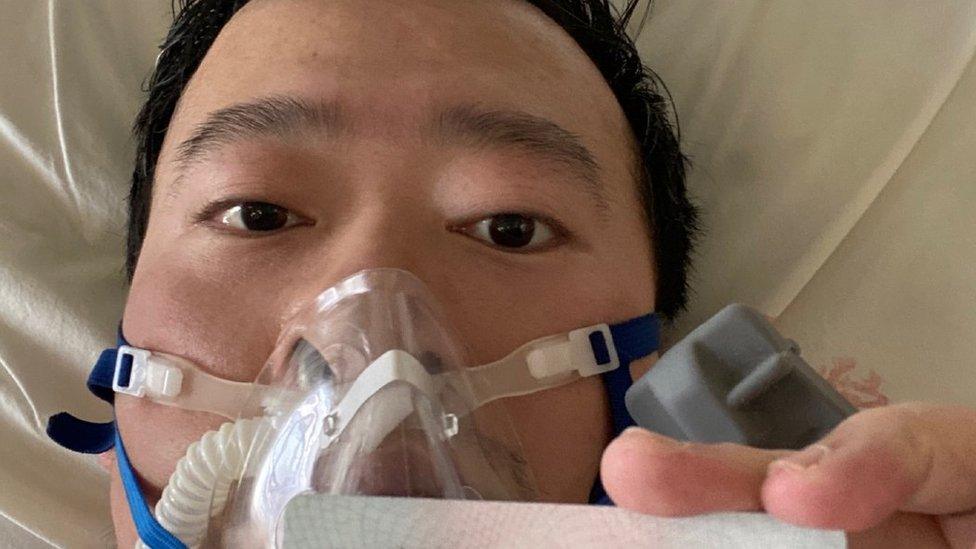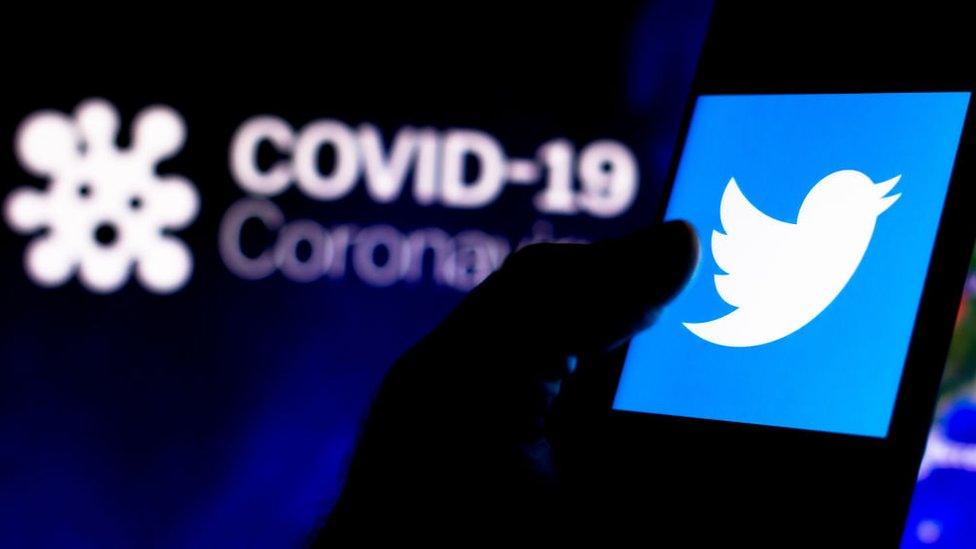China coronavirus: Most flights cut to Xinjiang after outbreak
- Published

Flights from around China will now face strict controls if they are to fly to and from Urumqi
Almost all flights in and out of Urumqi, capital of China's far-western Xinjiang region, have been cancelled because of a coronavirus outbreak.
The city has just six confirmed cases with symptoms and 11 asymptomatic infections, official figures show.
Strict measures to rein in the virus include stopping the single metro line and many public buses from operating.
After the pandemic emerged in China in late 2019, the country has driven new infections to consistently low levels.
To avoid a second wave, even small clusters are taken very seriously by health authorities. The initial outbreak in the city of Wuhan was brought under control through some of the world's strictest lockdown measures.
In Xinjiang, the government is promising decisive measures to contain the outbreak, according to local media reports.
More than 600 flights into and out of Urumqi Diwopu International Airport, more than 80% of Friday's total, were cancelled. Some social media users in the city say they have been told not to leave their housing estates.
Other social accounts suggested people were being stopped from entering or leaving Kashgar, another city in Xinjiang.
Xinjiang - which is home to the mainly Muslim Uighur people and other Turkic minorities - is already subject to intense state control.
The latest infections began to be detected on Wednesday, the first in the region for months.
A 24-year-old woman tested positive on Thursday after displaying symptoms. Three of her close contacts tested positive. However, they were asymptomatic.
Another asymptomatic case involved a man who travelled from Urumqi to the eastern province of Zhejiang, Chinese state media said.
From Friday, a number of airlines including Juneyao Airlines and Shenzhen Donghai Airlines require all passengers travelling to and from Urumqi to show a negative nucleic acid test taken within seven days.
Passengers must display a "safe to travel" health code, external, on an app which aims to identify potential virus carriers, the Chinese state-run Global Times says.
It is not clear when restrictions on transport will be lifted. State media put out assurances on Friday that shops were amply stocked with food in what was seen as an attempt to discourage people from panic-buying.


News of Xinjiang's coronavirus outbreak and the government's response there came quickly.
We'd only just heard of one case and suddenly most flights into and out of Urumqi had stopped and underground trains weren't running. The response seemed too overwhelming to be justified by just one infection, leading to questions on social media as to whether officials might be under-reporting the figures.
However, the tally went up on Friday morning and, crucially, health officials in Urumqi say they have at least 135 people under medical observation.
This has become the pattern in China. When a cluster appears, the government will throw a lot of resources into controlling it using mass testing, localised restrictions and the closing off of transport links to lock the outbreak in wherever it happens. This strategy seems to have worked in other cities, such as Beijing in June.
In Xinjiang there is the added sensitivity of controversial detention camps where hundreds of thousands of mostly ethnic Uighurs have been interned as part of a mass "de-radicalisation" programme. If the coronavirus got into one of those camps the same way as it has in prisons here, the possibly of widespread infection would be considerable.

The latest figures from China show 10 confirmed new cases, external, nine of them imported from overseas, the country's health authority said.
So far China's confirmed infections stand at 83,622, with deaths at 4,634. Beijing has reported no new cases for 11 days in a row.
There has been international concern that deaths in China have been under-reported. Questions have also been raised - by the US government and others - about Beijing's handling of the epidemic, particularly in its early stages.
Paul Adams asks whether China is being bolder in the wake of the pandemic
But China has also been praised for taking decisive steps to slow the spread of the virus.
The Chinese foreign ministry has repeatedly accused the Trump administration of trying to distract from its own problems tackling the crisis in an election year.
The US has more infections and deaths than any other nation.

SOCIAL DISTANCING: What are the rules now?
FACE MASKS: When should you wear one?
YOUR QUESTIONS: Our experts have answers

- Published13 June 2020

- Published6 February 2020

- Published12 June 2020
